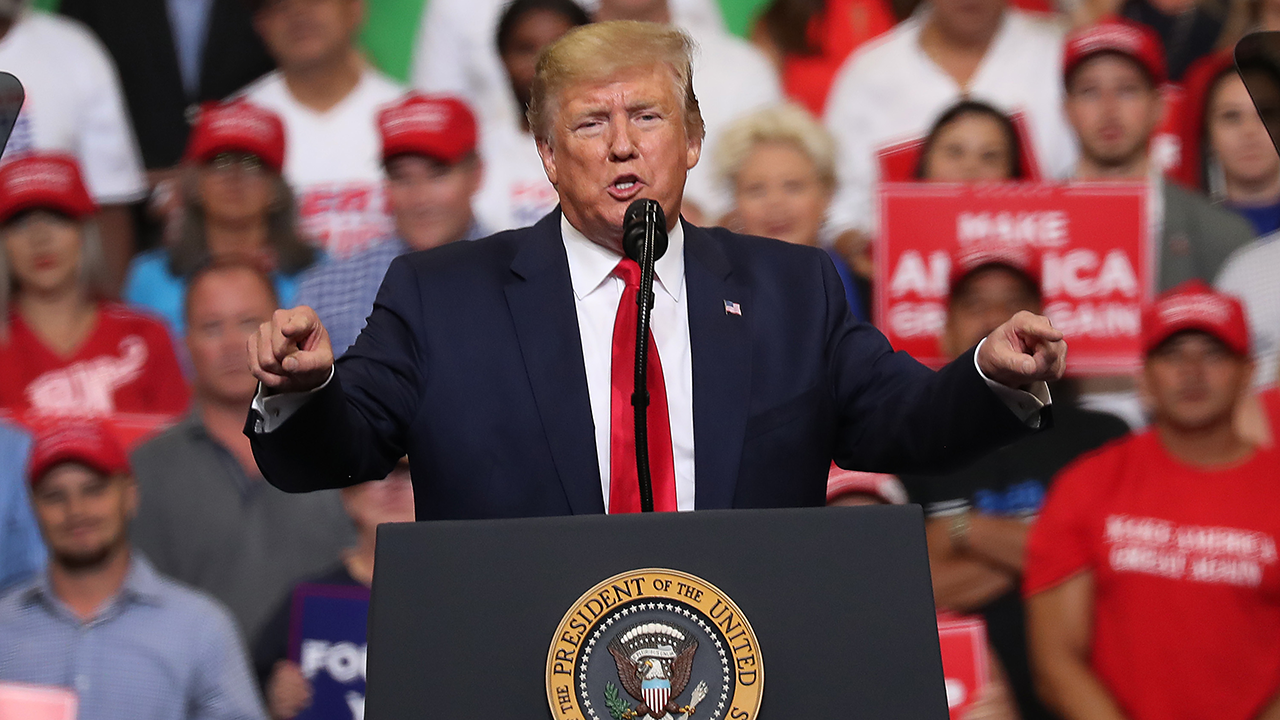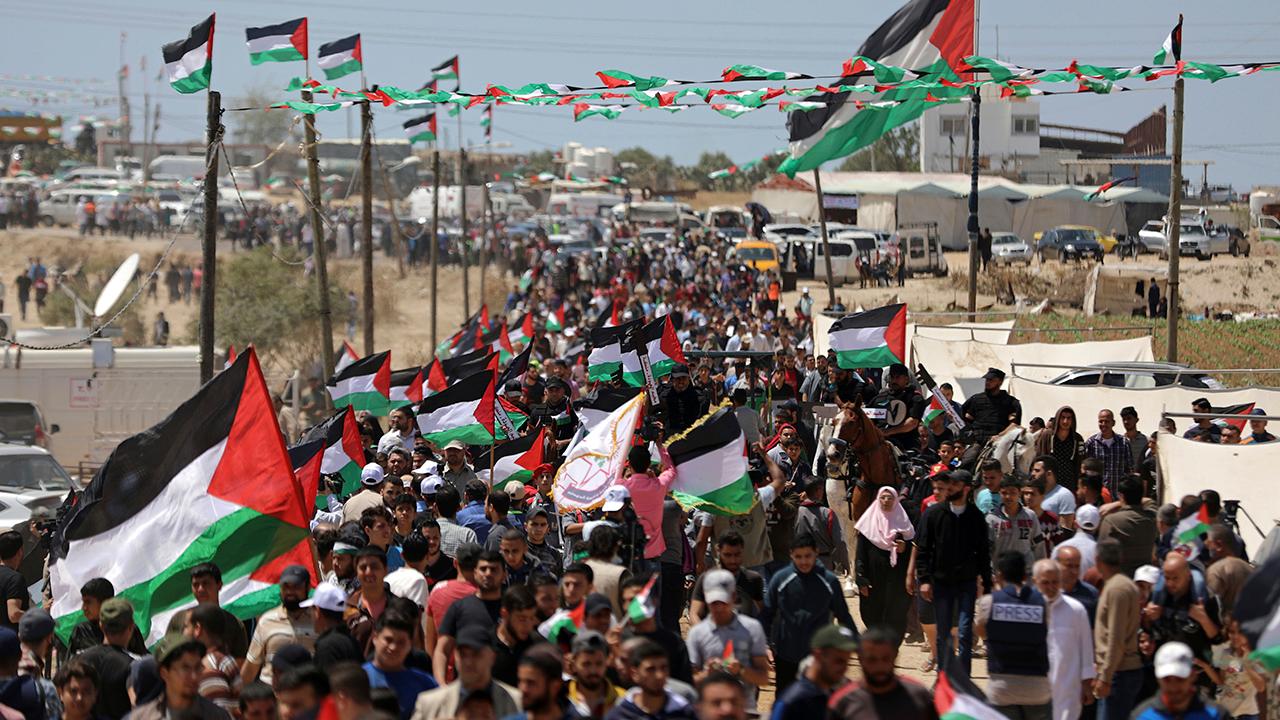President Trump imposed additional economic sanction on Iran on June 24, a few days after Iran shot down a U.S. surveillance drone near the Strait of Hormuz.
DUBAI — Iranian officials slammed the Trump administration Tuesday for new sanctions targeting the country’s leadership, saying the measures permanently closed the path to diplomacy and that the White House had “become mentally crippled” under the current president.
In a searing televised address, Iranian President Hassan Rouhani called restrictions against Iran’s supreme leader “outrageous and idiotic” and said they showed “certain failure” on the part of the Trump administration to isolate Iran.
“You call for negotiations. If you are telling the truth, why are you simultaneously seeking to sanction our foreign minister?” Rouhani said Tuesday, referring to remarks by U.S. officials suggesting plans to sanction Foreign Minister Mohammad Javad Zarif later this month.
Iran’s Foreign Ministry spokesman said on Twitter that the “useless sanctioning” of Supreme Leader Ali Khamenei and Zarif, who led Iran’s nuclear negotiations with world powers, “means the permanent closure of the doors of diplomacy.”
“Trump’s government is annihilating all of the established international mechanisms for maintaining world peace and security,” said the spokesman, Abbas Mousavi.
President Trump announced the measures Monday, which U.S. officials said came in response to the downing of a U.S. Navy surveillance drone over the Strait of Hormuz last week. The sanctions also targeted senior commanders of Iran’s Islamic Revolutionary Guard Corps and mean that foreign financial institutions providing significant “financial services” to any of the Iranian officials would be subject to U.S. penalties.
Rouhani said Tuesday that the sanctions against Khamenei — whom Trump described as “the one who is ultimately responsible for the hostile conduct of the regime” — were futile because the 80-year-old leader does not maintain any financial assets abroad.
He said: “Tehran’s strategic patience does not mean we have fear.”
National security adviser John Bolton described the new economic penalties Tuesday as “significant” but said that Trump has also “held the door open to real negotiations” with Iran.
He spoke at a trilateral summit of U.S., Israeli and Russian national security advisers in Jerusalem — the first of its kind.
Tsafrir Abayov
AP
National security adviser John Bolton says President Trump “has held the door open to real negotiations” with Iran.
“All that Iran needs to do is walk through that door,” Bolton said, adding that any deal would need to “eliminate Iran’s nuclear weapons program, its pursuit of ballistic missile delivery systems, its support for international terrorism and other malign behavior worldwide.”
Iran does not have a nuclear weapons program and has complied with restrictions to its atomic energy activities set out under the 2015 deal it negotiated with world powers, including the United States.
The Trump administration abandoned that pact and reimposed a near-total embargo on Iran’s economy, including its oil, shipping, manufacturing and banking industries.
Iran said last week that it was on course to boost its stockpile of low-enriched uranium beyond the limits prescribed by the deal, a move that arms control experts said does not pose a near-term proliferation risk.
The agreement curbed Iran’s nuclear energy program in exchange for widespread sanctions relief. But the deal’s other signatories, including the European Union, have struggled to maintain the economic benefits promised to Iran under the pact.
Trump has said that he is willing to speak to Iran with no preconditions, but U.S. officials said this week that there is currently no back channel between the U.S. and Iranian governments. And planned sanctions against Iran’s chief diplomat undermined the administration’s message that it seeks unconditional talks with Iranian officials.
“If Zarif is sanctioned, it won’t be to punish him because of his service to the Islamic Republic,” said Esfandyar Batmanghelidj, founder of the Europe-Iran forum that promotes business ties between Iran and European nations.
“It will be because of his own dogged commitment — to diplomacy — and of his proven ability to keep the door open for negotiations despite the sabotaging by rivals in both Tehran and Washington,” he said.
The sanctions were announced as Secretary of State Mike Pompeo began recruiting allies, including Saudi Arabia and the United Arab Emirates, to help monitor what they said were threats from Iran in the Persian Gulf. The United States has blamed Iran for a recent string of attacks on commercial tankers near the Strait of Hormuz, a key waterway for global oil shipments.
Iran has denied involvement in the attacks.
On the morning of June 20, Iran shot down a U.S. drone near the Strait of Hormuz, escalating tensions. Each country has given different accounts about the location of the incident.
Military officials have said a new program for international cooperation on maritime security in the Persian Gulf is still in the early stages. It will require foreign nations from Asia and the gulf region to provide payment or naval assets to help monitor and protect maritime commerce in the Middle East, said one official, who spoke on the condition of anonymity to discuss a program that has not been finalized.
Countries that buy and sell oil in the region would be asked in certain cases to escort ships, place vessels at fixed positions in the region or provide maritime patrol aircraft.
Pompeo also met with King Salman and his son, Crown Prince Mohammed bin Salman, on Monday in Saudi Arabia, which has signed on to the plan.
Trump complained on Twitter that the United States is “protecting the shipping lanes for other countries” and suggested he could stop U.S. naval patrols at the entrance to the Persian Gulf, one of the world’s most volatile flash points.
“All of these countries should be protecting their own ships on what has always been a dangerous journey,” Trump wrote.
Pompeo reiterated that message Monday during his meeting with Mohammed bin Zayed, the crown prince of Abu Dhabi. Asking for military help with maritime security, Pompeo said, “We’ll need you all to participate, your military folks.”
“The president is keen on sharing that the United States doesn’t bear the cost of this,” he added.
Eglash reported from Jerusalem. Carol Morello in Abu Dhabi, United Arab Emirates, and Missy Ryan in Washington contributed to this report.
Read more:
Today’s coverage from Post correspondents around the world
Like Washington Post World on Facebook and stay updated on foreign news
Let's block ads! (Why?)
https://www.washingtonpost.com/world/iran-says-path-to-diplomacypermanently-closed-following-us-sanctions/2019/06/25/636b48e6-96b7-11e9-9a16-dc551ea5a43b_story.html
2019-06-25 09:50:22Z
52780320488762





